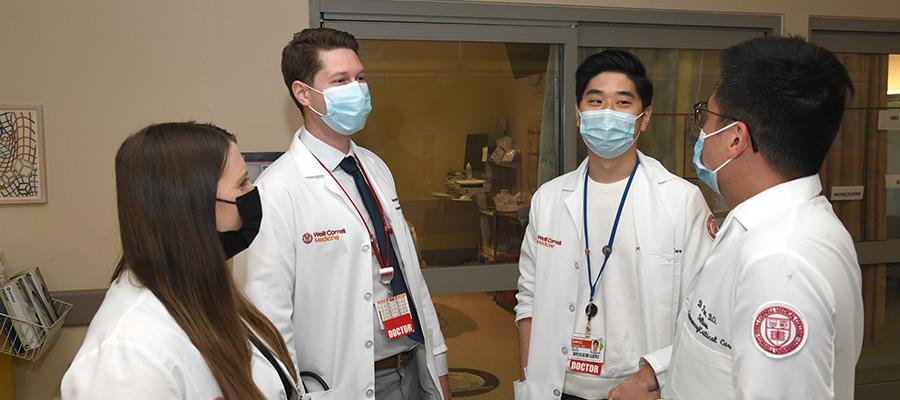
All fellows have at least 18 months of clinical rotations throughout the duration of their training. They also participate in several practical and didactic courses in their first year of fellowship, including the Protected Airway Course, Critical Care Fellows’ Ultrasonography Course, Pulmonary Fellows Orientation Boot Camp led by senior fellows and attendings, as well as longitudinal simulation sessions. A list of all core clinical rotations and simulation training courses are listed below.
The medical intensive care unit (MICU) at NewYork-Presbyterian Hospital/Weill Cornell Medicine is a 20-bed, closed unit ICU that treats over 1,200 patients annually. It serves as the tertiary referral center for the Weill Cornell Medicine network, including hospitals in Queens, Lower Manhattan, and Brooklyn. The MICU works closely with other clinical services, including our robust hematology oncology/bone marrow transplant service, liver transplant service, and others to provide the best care possible for our patients.
The unit is divided into two 10-bed groups, each staffed with four residents, led by a fellow, and supervised by an ICU attending. Fellows in the MICU take an active role in the care of critically ill patients by managing daily rounds, performing or supervising procedures, and providing both formal and bedside teaching to residents and medical students. Fellows rotating in the MICU are also part of the cardiac arrest team. Common procedures performed in the MICU by fellows include endotracheal intubation, bronchoscopy (therapeutic and diagnostic), central venous access, arterial line placement, Swan-Ganz catheter placement, and chest tube placement (surgical and percutaneous). MICU attendings also perform bedside percutaneous tracheostomies and train fellows in this procedure.
The inpatient pulmonary consultation service covers both NewYork-Presbyterian Hospital/Weill Cornell Medicine and the Hospital for Special Surgery. Fellows on the service are exposed to a wide array of pulmonary pathology and procedures. The consult service is typically staffed by two fellows and supervised by a dedicated pulmonary attending. Fellows on the service are also members of the multidisciplinary Pulmonary Embolism Response Team and participate in the triage and management of patients with high-risk pulmonary emboli. In addition to consulting on patients on the general floors, they consult in the non-medical ICUs as well as the medical step-down units where they assist with ventilator management. On the consultation service, fellows perform bedside procedures such as thoracentesis, percutaneous chest tube placement, and bronchoscopy.
In addition to training on the pulmonary consultation service, fellows do a physiology rotation and radiology/ pathology rotations and may rotate through selected clinical electives including Interventional Pulmonary, Sleep Medicine, Lung Transplantation, and Pulmonary Hypertension.
The fellow on this service performs procedures in our bronchoscopy suite under the supervision of a dedicated attending and may assist the consult service in performing bedside procedures.
|
|
The ICU Outreach Service serves three important roles. First, it provides critical care triage and consultation for patients in the Emergency Department or on the wards. Second, it provides critical care consultation services to other intensive care units, such as the Cardiac ICU or Neurological ICU. Third, the ICU Outreach service also provides continuity of care for patients recently transferred out of the MICU. The ICU Outreach Service is staffed by an internal medicine resident dedicated to the triage and transfer of critically ill patients from the Emergency Department and wards and is supervised by an attending. Fellows rotate on this service and work with residents throughout the year and are involved with the outreach team on the weekends and nights.
Through their three years of training, fellows participate in a weekly continuity outpatient clinic that alternates between care for patients with general pulmonary diseases and for patients with interstitial lung diseases. Through the ambulatory care system, fellows build a panel of patients for whom they will follow over the course of the fellowship, with the guidance of a preceptor. Our practice also offers the use of telemedicine, in which Video Visits enable our patients to have appointments virtually - helping them access care more conveniently.
The robust simulation training program includes an airway course held in conjunction with the Division of Emergency Medicine, an ultrasound course that all junior fellows attend, a pulmonary fellow orientation boot camp consisting of didactics and procedural and critical care simulation, and access to a cutting-edge simulation center. Our attendings also facilitate regular simulation sessions throughout training to enhance procedural and clinical competence.
Fellows attend a dedicated introductory ultrasonography course during the summer of their first year of training. The course provides extensive instruction in image acquisition and optimization using live models. This is followed with virtual classroom learning in advanced cardiac ultrasound pathology, monthly multi-departmental academic case presentations with in-depth literature review, and weekly image review sessions. Ultrasound image portfolios are developed throughout the year and images are reviewed for quality assurance by referees certified by the American Society for Echocardiography. Additional simulation training in surface cardiac ultrasound as well as transesophageal echocardiography are available using advanced trainers through our simulation center.
| Month | Year 1 | Year 2 | Year 3 |
|---|---|---|---|
| July | Pulmonary - Consult | Elective | Research |
| August | MICU | Pulmonary - Consult | Research |
| September | Pulmonary - Procedure | NonMICU[2] | Research |
| October | MICU | MICU | Research |
| November | Pulmonary - Consult | NonMICU[3] | Research |
| December | MICU | MICU | Research |
| January | Pulmonary - Consult | Research | Research |
| February | NonMICU[1] | Research | Research |
| March | Pulmonary Elective | Research | Research |
| April | MICU | Research | Research |
| May | Pulmonary - Consult | Research | Research |
| June | MICU Nights | Research | Research |
All rotations with 1 session/wk outpatient ambulatory practice (10%)
[1] Non-Medical Intensive Care Unit/Anesthesiology
[2] Non-Medical Intensive Care Unit/Cardiothoracic [includes 1x/wk Continuity Clinic]
[3] Non-Medical Intensive Care Unit/Neurosurgical Nights: 3-4 wks of MICU night coverage
Vacation: 4 wks taken in 1-4 wk blocks
